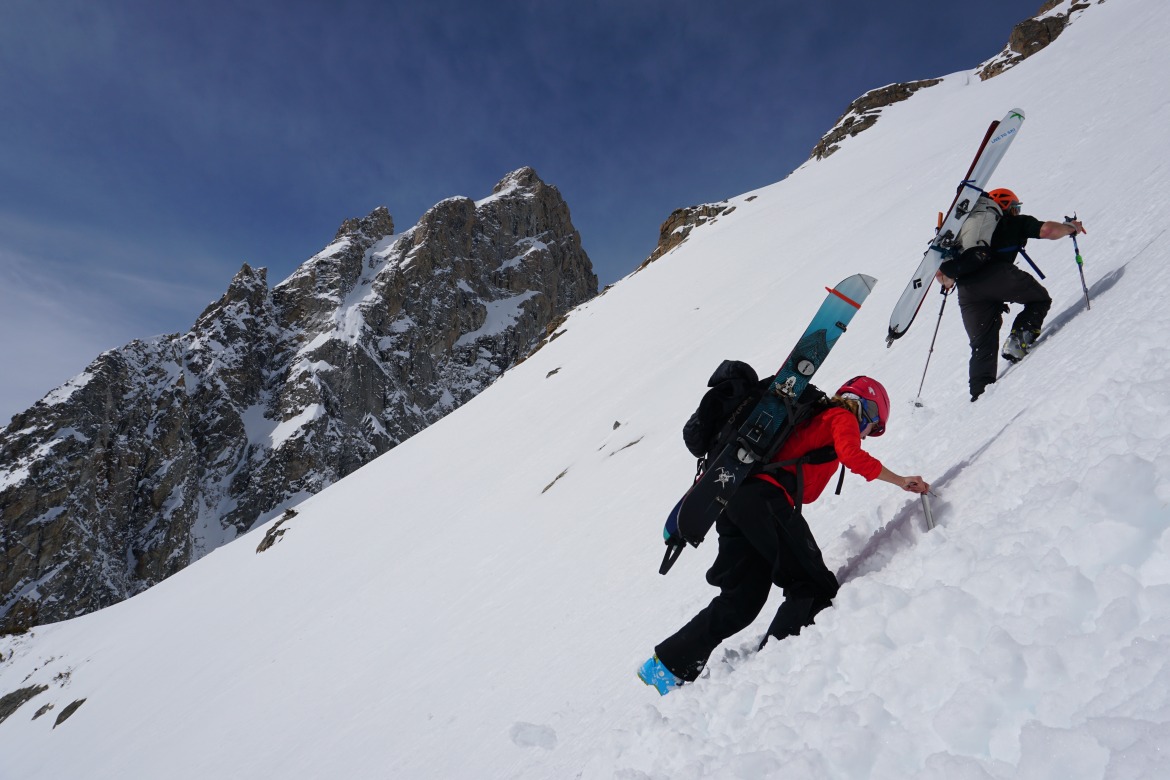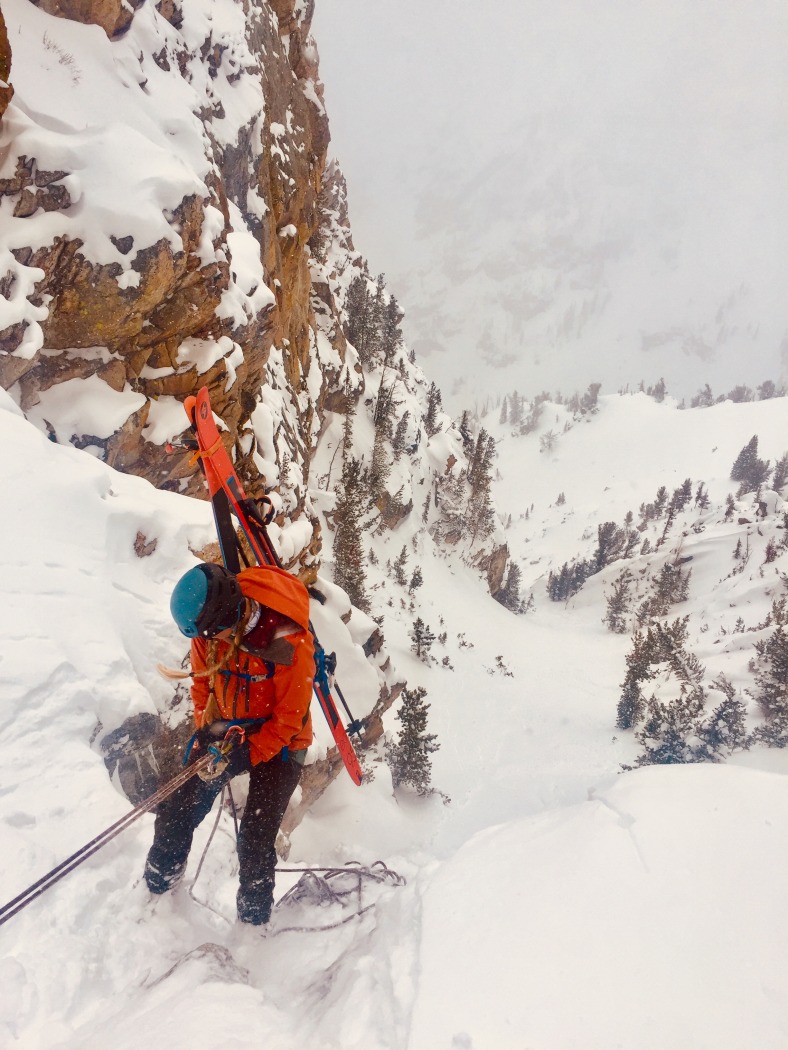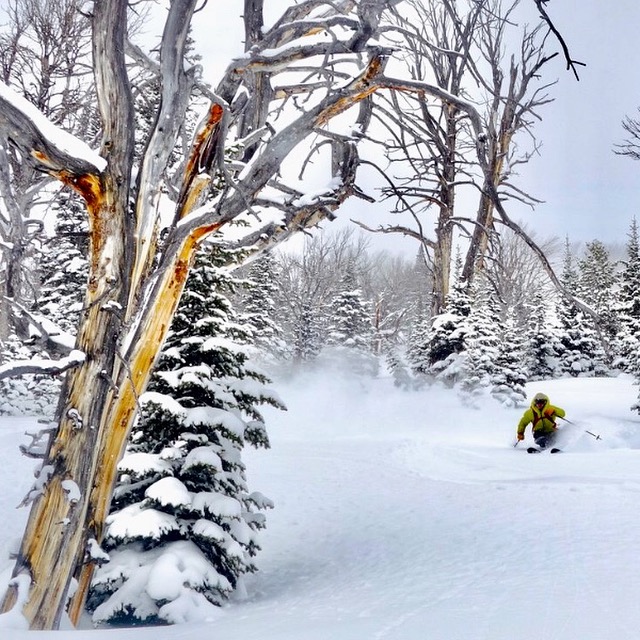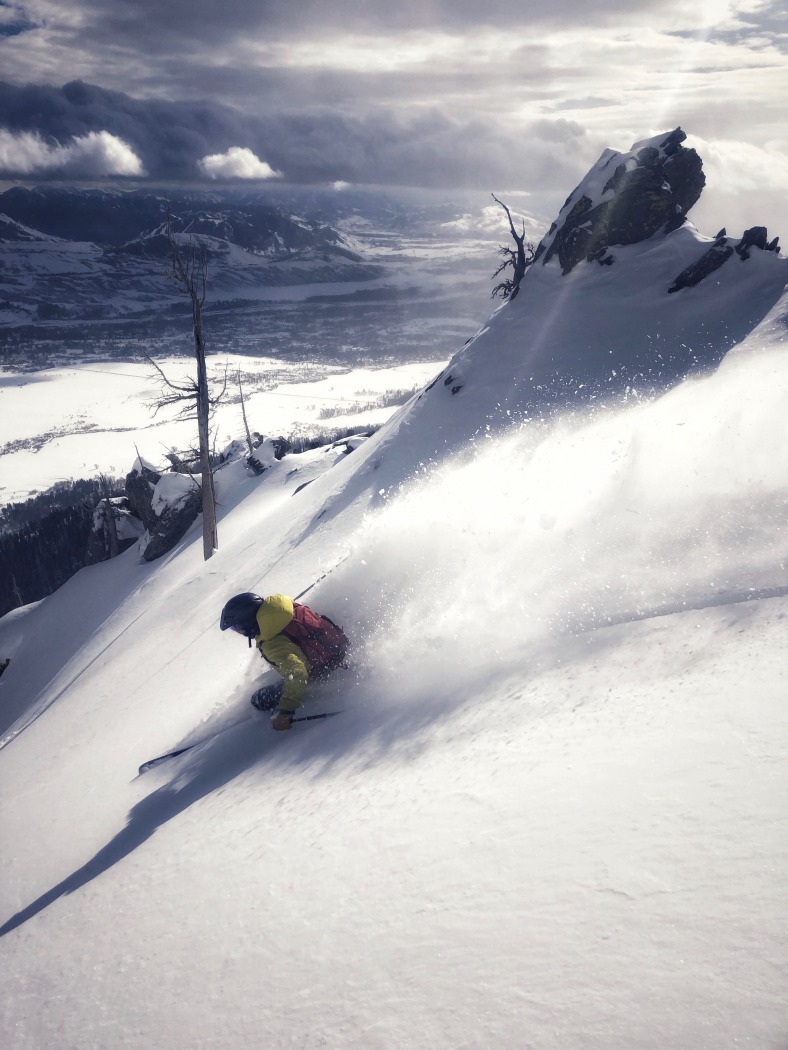
The draw of powder and immersion into the mountains leads us into terrain where self-deception should be checked at the trailhead. Photo: Elise Sterck Skier: Ryan Burke
With the new winter upon us, it’s time to reflect on how we make ourselves vulnerable in the mountains and to refine our processes to become humble and aware of the big terrain we’ll undoubtedly encounter.
Self-deception is as much a part of our daily routines as morning coffee. It could be a little white lie or a big whopper; no one is immune to the manipulative power of the human mind. Sometimes our brains slant the truth to speed things along, and other times we lie to ourselves to rationalize a risky choice. Often times, when heading into the unknown, distorting information gives us the illusion of safety, helping us to gain the rewards hidden beyond the next bend. These hollow confidence boosts were a necessary survival skill for our ancestors, coaxing the timid amongst us out of the comfortable cave and into resource-rich environments. Of course, a small number of these brave individuals met an untimely death, but if wiring the human brain to hyper focus on rewards and downplay risks helped the species survive, then evolution deemed the sacrifice worth it.
Times have changed. We don’t live in the same harsh realities as our forebears, but we still march forward often without questioning the veracity of our internal dialogue. This outdated programming of swallowing half-truths and manipulating information could have gone the way of the dinosaurs. It stuck around instead. Maybe this is because lying to ourselves in everyday life seems to have limited consequences to our physical safety and extraordinary protective benefits to our emotional well being.
What about when the stakes are higher, like in backcountry skiing, where flawed information can mean the difference between coming home safely and saying goodbye forever? Should we also accept this design flaw that chooses to see reality as we want it to be versus how it really is?
In avalanche terrain, stretching the truth of your abilities, and manipulating the narrative to fit your needs, could easily result in a trip to the emergency room, activating an emergency beacon, or worse. Does it then seem like a good idea to use the same mental shortcuts in the backcountry as we do when we’re selectively curating our lives in civilization? In avalanche terrain, a higher standard of care is necessary, starting by examining the false beliefs we hold about ourselves and our surroundings.
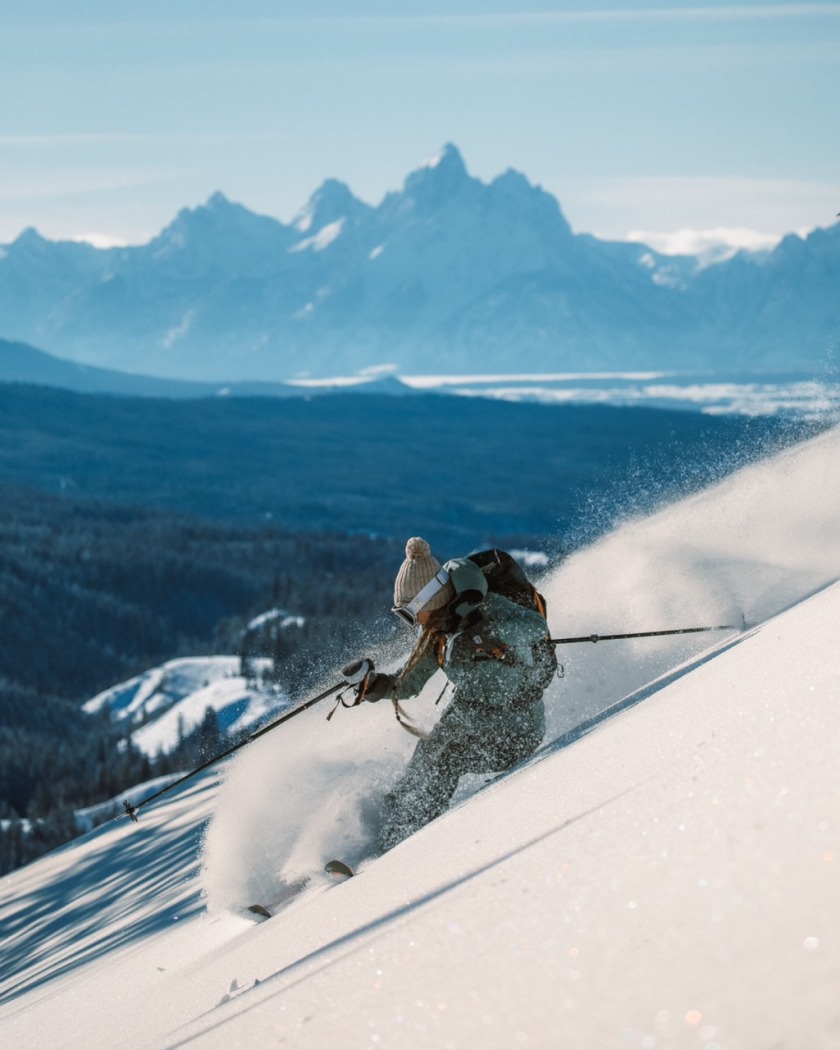
Seeking the goods in the Teton backcountry often requires taking no mental shortcuts. Photo: Ryan Burke Skier: Elise Sterck
Skiing in deep powder and sunlit mountains is something I can’t live without. However, denying they are a double-edged sword can only cause me trouble in the long run. Backcountry skiing is both incredible and deadly.
In my early days of exploration, I truly believed that something as pure and joyous as deep snow would never turn against me. I framed myself as the story’s main character, who powder would never betray. Dangerously intoxicated with the thought of my uniqueness, this belief system allowed me to fill in the blanks I wanted to see and imagine patterns that didn’t exist. When I started making decisions on my own, I would only visualize successful outcomes when standing at the top of the line and, therefore, casually ignore potential threats that could cause me harm. Now, after twenty years of hindsight, winter’s dismal indifference to my fairy tales couldn’t be clearer. However, I still can’t predict with any certainty by the end of the season who will be caught in an avalanche and who won’t.
I’m not saying that backcountry safety is a total roll of the dice; it isn’t. Knowledge, humility, and experience all seem to play a part in staying alive. What throws me off is learning about the death of backcountry ski legends or hearing my local mentors were caught in a slide they didn’t see coming. Combine this with multiple close friends that have passed away in the backcountry, and it shakes my confidence in whether it’s a good decision or not to keep marching forward. During my introspective moments, I rationalize that I make safer choices than others, but ultimately this is a lie I tell myself to continue enjoying the sport I love.
The truth is a little more raw. The reality is I could very well be caught in an avalanche if I keep at this long enough. Whenever questioned, I outwardly acknowledge the risks of backcountry skiing, but often behind this scripted rhetoric is a hidden belief that avalanches happen to other people, not to me. I’m not advocating that we all stay at home and watch football this Sunday. I am telling myself not to have a cavalier attitude around a loaded weapon. In avalanche terrain, it’s not just my physical well-being I’m putting on the line but also the mental well-being of my family and friends if things don’t go well. My mind doesn’t like recognizing this fact because it gives a sour taste to an otherwise glorious experience. However, understanding backcountry risk is about fully coming to terms with all the potential outcomes, not just the scenarios I want to happen.
Once I adjust my lens to see the whole picture, maybe then I can accept turning around as a necessary choice instead of a perceived failure. To me, choosing to return home safely sometimes feels like a participation ribbon for last place, mostly because “failing” to complete my objective can tank my self-worth. I often tell myself a common lie: I’m only as valuable as my last athletic achievement. My therapist would say that is blatantly not true, but that is hard to conceptualize when you live in a town where the currency of the land is athletic success and what you buy with those accomplishments is favorable standing.
I don’t speculate where I rank in the ski hierarchy anymore, but I’m still a member of the world’s most social species, and not comparing myself to others is hard to do. The need for social acceptance is hard to quantify, but what is certain is that when my attention is more focused on others, it’s not concerned with the task in front of me. It’s hard to pay attention to terrain traps and new snow loading if I’m sidetracked by fear of social rejection. Consciously, I know my partners will listen if I’m confused and understand if I make a mistake, but when my unconscious brain tells me a lie often enough, it starts to feel like the truth.
The reality is that people bond over their imperfections, and what keeps us divided is the unrealistic charade of wanting to appear perfect. Showing “weakness” isn’t a liability; it’s a strength to look inside yourself and see what you desperately want to hide. Confidence in the face of danger is admirable, but understanding our flaws and limitations defines competency. We all have a unique set of internal danger signs we must watch out for, just like a weak faceted layer buried two feet deep. Your mental blindspots and personal hot buttons all have the potential to push you into a sketchy situation. Yet when the dominos start to fall, and clear decisions are necessary, it will already be too late to deal with your demons. Turn inwards now and self-reflect on lessons learned before you find yourself in a situation that is spiraling downward. Your areas of internal self-growth could look dramatically different from the problems that plague me, but overall never forget that knowing yourself is just as important as knowing the terrain.
You can read more of Ryan’s thoughts on emotional intelligence in the backcountry in his piece High Minded
Ryan Burke is a licensed professional counselor and endurance mountaineer. Burke readily admits to making many mistakes in the backcountry due to impatience, ego, and social pressure. Learning from each one since moving to the Teton area in 2004

